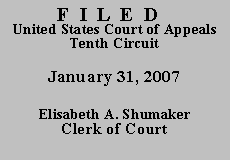

| SCOTT ALAN WATSON, | |
| Plaintiff-Appellant, | |
| v. | |
| BOARD OF COUNTY COMMISSIONERS OF SALINE COUNTY, KANSAS; GLEN KOCHANOWSKI, Sheriff, Saline County Jail; BETH KOMAREK, Nurse, Saline County Jail; MICHAEL J. WHITE, Saline County Commissioner; CRAIG STEPHENSON, Saline County Commissioner; SHARON A. BARRAGREE, Saline County Commissioner; JOHN DOES, in their individual and official capacities, | |
| Defendants-Appellees. |
This is a pro se state prisoner § 1983 action. Appellant's complaint alleges that his constitutional rights were violated as a result of the cruel and inhumane treatment he received while temporarily incarcerated at the Saline County Jail located in Salina, Kansas. Appellant has a history of mental illness, and his claims arise primarily from practices employed and conditions maintained at the Saline County Jail in order to deal with mentally ill and suicidal prisoners. The district court dismissed Appellant's complaint for failure to comply with the applicable statute of limitations and this appeal ensued.
As the district court noted, Kansas law maintains a two-year limitations period for § 1983 claims. Kan. Stat. Ann. § 60-513(a); Brown v. Unified Sch. Dist. 501, Topeka Pub. Schs., 465 F.3d 1184, 1188 (10th Cir. 2006). That period is tolled, however, for persons under legal disability. Kan. Stat. Ann. § 60-515(a). Under § 60-515(a), a disabled person may bring an action within one year after the disability is removed, so long as that action is not commenced more than eight years after the act giving rise to the action.
Plaintiff alleges that his mental illness, as exacerbated by the conditions of his confinement in the Saline County Jail, rendered him "unable to 'process[] the constitutional violations'" (Order, No. 05-3465-SAC, at 3 (D. Kan. Aug. 15, 2006) (alteration in original) (quoting Resp. to Order to Show Cause at 9)) until he was transferred to the Wyoming State Penitentiary and received medical reports and documents relating to his treatment at Saline County Jail(1) (id. at 4). Plaintiff argues on appeal that he suffered not only from schizophrenia, but also memory loss, and that the district court failed to take this memory loss into account in determining the date that his disability had abated. According to Plaintiff, his continued memory loss requires that the statute of limitation be tolled until his receipt of the medical reports and documents related to the Ginest case.
The district court found Plaintiff's action untimely based upon an action filed by Appellant in the United States District Court for the District of Wyoming on October 6, 2004. That action made claims similar to those presented by the complaint in the instant action, but against officials responsible for Carbon County Jail, where Plaintiff was held following his time at Saline County Jail. Given this action, the district court stated:
Thus, it appears the plaintiff was mentally capable of preparing a complaint by no later than October 2004, and that he had sufficient access to the courts to do so. . . . Because it appears his incapacity was relieved by October 2004, he had until October 2005, under the tolling provision contained in K.S.A. 60-515[,] to commence this action. However, he did not commence this action until December 2005.
(Id. at 5.) As that date was two months past the one-year tolling period provided by Kan. Stat. Ann. § 60-515(a), the district court dismissed the instant action as untimely.
Plaintiff argues that while no disability prevented him from recalling his treatment at Carbon County Jail or filing suit over that treatment, his memory loss prevented him from remembering his treatment at Saline County Jail. While the district court's analysis would not necessarily apply to Plaintiff's claimed memory loss concerning his treatment at Saline County Jail, we note that Plaintiff's claimed selective memory loss is wholly unsupported by medical documentation or testimony. Accordingly, we see no reason to reverse the district court's decision.
We therefore AFFIRM the district court's dismissal of this action as beyond the applicable statute of limitations.
Entered for the Court
Monroe G. McKay
Circuit Judge
*. This order and judgment is not binding precedent, except under the doctrines of law of the case, res judicata, and collateral estoppel. It may be cited, however, for its persuasive value consistent with Fed. R. App. P. 32.1 (eff. Dec. 1, 2006) and 10th Cir. R. 32.1 (eff. Jan. 1, 2007).
1. Appellant received these materials in relation to a class action lawsuit, Ginest v. Bd. of County Comm'rs, 333 F. Supp. 2d 1190 (D. Wyo. 2004), in which he was involved and which concerned violations of a consent decree governing prisoner treatment.